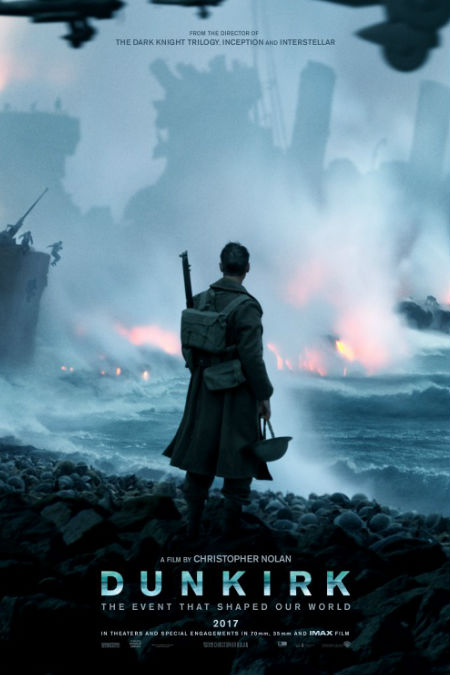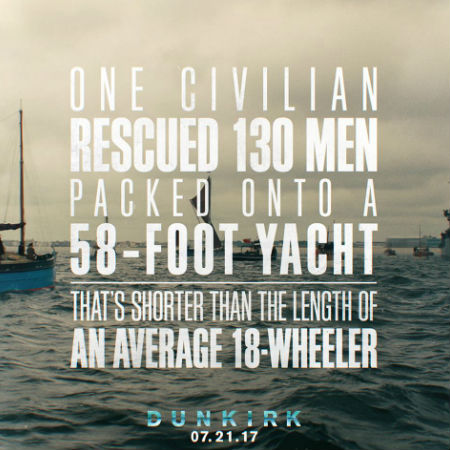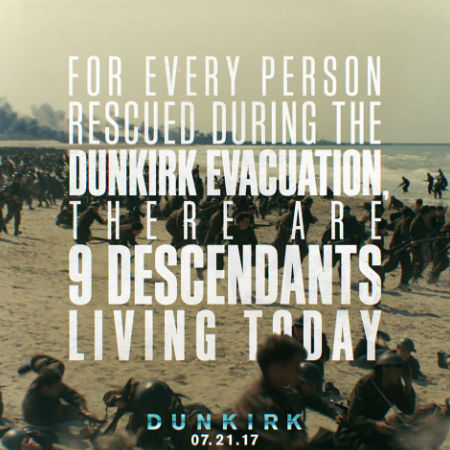
War is, by any estimation, a harrowing and horrifying experience.
There is nothing edifying or life-affirming about it in any way, but as Christopher Nolan’s latest, and you could well argue, greatest masterpiece Dunkirk demonstrates with engrossing intensity, the actions of people within that macabre theatre of human misery can be both of these things.
Set in May-June 1940, when 400,000 British, French, Belgian and Canadian troops were massed in the titular French coastal town, pinned down by overwhelming numbers of German soldiers who had encircled them from every side and were, quite literally, moving in for the kill, the film is testament to the fact that even when the worst of humanity’s traits are in full, voluble sway that it is possible for hope and faithfulness and life to find a way through.
Using Churchill’s inspiring speeches as narrative inspiration, which reference fighting the enemy on the beaches, in the air and on the sea, Nolan, who wrote the screenplay, gives us a story split three, highly-dramatic and never-uninvolving ways.
Throughout the film’s 106 minutes, an admirably slim running time for such an impressive blockbuster that sees the film not once overstay its welcome or overplay its hand, we are introduced to a number of airmen, soldiers and navy personnel, none of whom we get to know particularly well, but all of whom have stories so compelling that it is near to impossible to lose interest or turn away.
Dunkirk is intense, drawing on everything from Hans Zimmer’s beautiful, pounding score that builds and builds tension and mood almost from the get-go to adroit switches from one story arc to another (all of which play out over different time periods). Through all this it is never once manipulative, happy, if you can use that word in a film so emotionally taxing on multiple levels, to let this dramatically true story do its own talking.

The secret to bringing what is, by any count, a mammoth recounting of events, which saw almost 340,000 servicemen rescued from near certain death or capture (far in excess of British military command’s initial goal of saving 30,000 personnel), is narrowing the narrative’s focus down to a number of highly-concentrated, very personal tales.
Hardly an innovative strategy, and one employed by many films dealing with so large an historical canvas, but where Nolan, succeeds, and succeeds brilliantly, is by making these stories count, drawing out key elements of bravery and fortitude of the many people who transformed, by their bravery and perseverance, what could have been an utter catastrophe into a triumph, one that is often popularly referred to as the Miracle of Dunkirk.
On the sea, we are introduced to Mr Dawson (Mark Rylance) and his son Peter (Tom Glynn-Carney), and their teenage employee George (Barry Keoghan), whose small boat has been requisitioned by the navy to rescue trapped personnel from the beaches at Dunkirk (where they rather stoically line up in very neat lines, despite the constant threat of strafing by the Luftwaffe).
Setting out bravely but knowing full well the risks involved – the channel crossing is strewn with the carcasses of large naval ships who run afoul of German U-Boats and bombers – they first encounter a deeply-traumatised sinking survivor played by Cillian Murphy, who’s huddled atop the floating wreck of the ship that should have been his salvation.
While they try to reassure him that he will be OK, despite his understandable and quite aggressive concern that going back to Dunkirk will be the death of them all, a gambit which comes with tragic circumstances, they come across a huge number of survivors of another sinking, coated in oil and close to be being burnt alive if their oily, watery prison catches fire.
Their actions in saving so many men typifies those of so many small boat owners who came from ports up and down the British east coast, responding to a call to save their country’s brightest and finest fighting men.
Nolan admirably demonstrates how important these boats were to the eventual success of the evacuation officially known as Operation Dynamo, with their arrival en masse a heroic and tear-inducing moment that, thanks to the carnage already displayed onscreen with relentless and emotionally-resonant precision, preparing us for how remarkable an occurrence this was given the circumstances.
The tears in the eyes of Commander Bolton (Kenneth Branagh) and his sincere utterance that these boats represent hope don’t come across as twee for even a nanosecond, proof that Nolan’s pitch-perfect nuanced screenplay and his expert direction have communicated profoundly well just how miraculous, and moving, a moment this was.

Heroic escapes and actions aside, and there are many of them despite the death toll that was all but inevitable with so many men packed so tightly on one beach, the most compelling part of Dunkirk, even if you know your history, is will these men survive?
No matter how you crunch the numbers of survivors, Nolan makes it plainly clear that the fact that anyone survived at all is as close to a miracle as we get in this world, particularly when it is ripping itself apart in war; in fact, as we see characters like the lead, British army private Tommy (Fionn Whitehead) and his compatriots Alex (Harry Styles, who acquits himself well in his first major role) and an unnamed French soldier played by Damien Bonnard, have survival pulled from their hands over and over and over again, you marvel at the fact that anyone made it out alive.
As Nolan explained to The Wrap, this was precisely his intent for the film:
“The empathy for the characters has nothing to do with their story. I did not want to go through the dialogue, tell the story of my characters … The problem is not who they are, who they pretend to be or where they come from. The only question I was interested in was: Will they get out of it? Will they be killed by the next bomb while trying to join the mole? Or will they be crushed by a boat while crossing?”
It is this goal for the film that informs its sparse dialogue, reliance on mood and intensity over indepth character-setting – though a sense of the people involved and what survival meant to them most certainly emerges and with powerful conviction – and which ultimately renders it such an immeasurably remarkable and intensely-affecting piece of cinema.
Whether we’re out on the boats or witnessing aerial dogfights between the Luftwaffe and British airmen such as Collins (Jack Lowden) or Farrier (Tom Hardy), or on the crowded wharf and beaches of Dunkirk, we bear witness in ways all too heroic and often supremely heroic and selfless, to the great, tenacious capacity of the human spirit to fight for survival, no matter how horrifically overwhelming the odds.
Dunkirk is a magnificent, utterly immersive experience that never trivialises its gripping events as some cheesy, half-baked cliche of war story tropes, choosing instead at every turn to double down on its humanity – it never shirks from the idea that some people simply want to survive, no matter what but it never demonises them, casting an understanding eye on what drove them – and the realness of war, and the capacity of men to be noble and achieve great things despite the nightmare unfolding around them, and the great costs that inevitably come with heroic sacrifice.